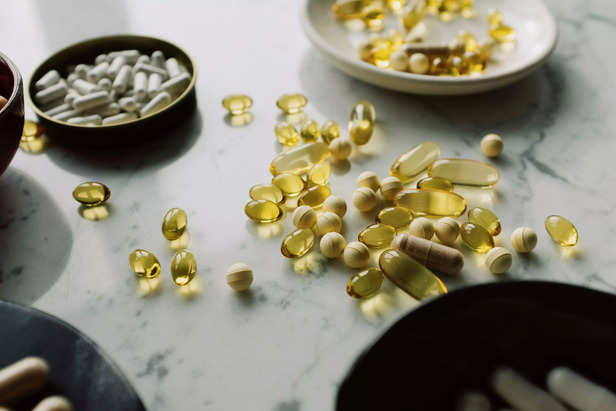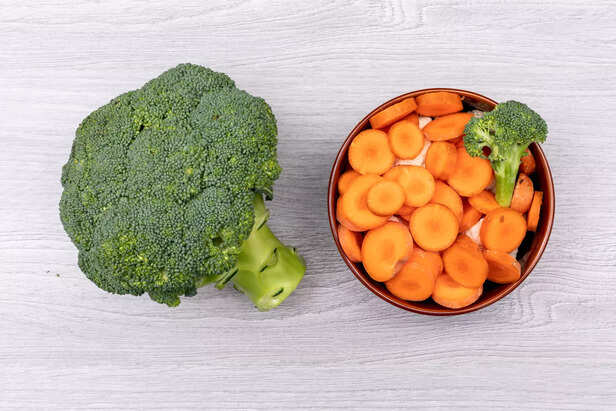The Top 5 Nutrients Every Pet Requires (But Most Diets Are Missing)
Nikita Kanyal | Jan 16, 2025, 09:34 IST

( Image credit : Times Pets )
Your pet's health and happiness depend on a well-rounded diet rich in essential nutrients. Unfortunately, many commercial pet foods fail to sufficiently supply critical components like omega-3 fatty acids, easily digestible fiber, and quality proteins. This article examines the five most important nutrients that every pet needs but are frequently absent from numerous diets. Learn how to recognize deficiencies, correct them with simple dietary changes, and ensure your cherished pet gets the nutrition they need for a lengthy, healthy life.
When it relates to maintaining the health and happiness of our cherished pets, nutrition is vital. Although numerous pet owners prioritize providing meals for their animals, they might not realize that standard pet diets frequently fail to supply the necessary nutrients their companions require. Similar to people, pets need a well-rounded intake of crucial nutrients to flourish. In the absence of these essential nutrients, pets may experience various health problems, ranging from weakened immune systems to lackluster coats and diminished energy levels.
1. Omega-3 Fatty Acids

You’ve likely heard of omega-3s before, especially when it comes to human nutrition. But they’re just as important for your pets. Omega-3 fatty acids are vital for maintaining healthy skin, a shiny coat, and a robust immune system. These healthy fats also reduce inflammation, which can help alleviate joint pain something many senior pets experience.
Unfortunately, many commercial pet foods don’t provide enough omega-3s, especially if they’re predominantly made from low-quality meat sources like chicken or beef that don’t naturally contain these fatty acids.
Why They’re Important:
1. Support brain function and cognitive health
2. Reduce inflammation and joint pain
3. Improve skin health and reduce allergies
How to Fix It :
Look for pet foods or supplements that contain sources of omega-3s like fish oil or flaxseed. Adding fresh, oily fish like salmon or sardines to your pet’s diet is another excellent way to boost omega-3 intake.
2. Digestible Fiber

Fiber is often overlooked when it comes to pet nutrition, but it plays a vital role in digestive health. Proper digestion is essential for your pet’s overall well-being. Fiber helps regulate bowel movements, prevent constipation, and maintain a healthy gut microbiome, which supports the immune system.
Many commercial pet foods don’t provide enough fiber, especially if they’re heavily processed. Diets lacking fiber can contribute to digestive discomfort and even chronic gastrointestinal issues.
1. Encourages proper digestion and helps avoid constipation
2. Aids intestinal health and maintains the equilibrium of beneficial bacteria
3. Lowers the likelihood of long-term digestive problems
How to Resolve It :
Seek out foods abundant in natural fiber sources such as vegetables, legumes, and whole grains. Pumpkin puree, sweet potatoes, and brown rice serve as great fiber sources for pets. Think about fiber supplements if needed, but always check with your veterinarian before incorporating them.
3. Vitamins A, E, and C

Vitamins A, E, and C are antioxidants that play a crucial role in protecting your pet’s cells from damage caused by free radicals. Free radicals can contribute to aging, inflammation, and a weakened immune system. Many pets don’t receive adequate amounts of these key vitamins due to their absence in processed foods or insufficient supplementation.
Why They’re Important:
1. Vitamin A supports eye health and skin health
2. Vitamin E helps reduce inflammation and supports the immune system
3. Vitamin C boosts the immune system and helps fight off infections
How to Fix It:
Feed your pets a diet rich in fruits and vegetables like carrots, broccoli, and berries, which are naturally high in vitamins A, E, and C. Consider adding a multivitamin formulated for pets or supplements recommended by your vet.

Protein is often considered a top priority in pet diets, but not all proteins are created equal. Many commercial pet foods rely on low-quality protein sources like by-products or fillers, which don’t provide the essential amino acids pets need to thrive. High-quality protein helps build and maintain muscle mass, supports immune health, and keeps your pet’s energy levels up.
Why They’re Important:
1. Supports muscle health and maintenance
2. Boosts immune system function
3. Provides essential amino acids necessary for bodily functions
How to Fix It:
Opt for high-quality protein sources like chicken, turkey, fish, lamb, or beef. Always read the ingredient list on pet food labels—whole meat should be the primary protein source, not by-products or fillers. If your pet has specific dietary needs, consult your vet for protein supplements or alternate food sources.

Gut health is often overlooked but plays a massive role in your pet’s overall health. Probiotics (the beneficial bacteria) and prebiotics (the food that fuels these bacteria) are essential for maintaining a balanced gut microbiome, which supports digestion and immune function. A disrupted gut can lead to everything from digestive discomfort to an increased risk of infections.
Unfortunately, many commercial diets don’t include enough probiotics and prebiotics to support your pet’s gut health adequately.
Why They’re Important:
1. Supports digestion and reduces gastrointestinal issues
2. Enhances nutrient absorption and overall immunity
3. Helps maintain a healthy balance of gut bacteria
How to Fix It:
Look for foods that contain probiotics, such as fermented products like yogurt or kefir, as well as prebiotics like inulin from sources like chicory root or fiber-rich vegetables. Probiotic and prebiotic supplements formulated for pets can also be beneficial, but always check with yo
1. Omega-3 Fatty Acids

Improve skin health ( Image Source : Pixabay)
( Image credit : Times Pets )
You’ve likely heard of omega-3s before, especially when it comes to human nutrition. But they’re just as important for your pets. Omega-3 fatty acids are vital for maintaining healthy skin, a shiny coat, and a robust immune system. These healthy fats also reduce inflammation, which can help alleviate joint pain something many senior pets experience.
Unfortunately, many commercial pet foods don’t provide enough omega-3s, especially if they’re predominantly made from low-quality meat sources like chicken or beef that don’t naturally contain these fatty acids.
Why They’re Important:
2. Reduce inflammation and joint pain
3. Improve skin health and reduce allergies
How to Fix It :
Look for pet foods or supplements that contain sources of omega-3s like fish oil or flaxseed. Adding fresh, oily fish like salmon or sardines to your pet’s diet is another excellent way to boost omega-3 intake.
2. Digestible Fiber

( Image Source : Pixabay)
( Image credit : Times Pets )
Fiber is often overlooked when it comes to pet nutrition, but it plays a vital role in digestive health. Proper digestion is essential for your pet’s overall well-being. Fiber helps regulate bowel movements, prevent constipation, and maintain a healthy gut microbiome, which supports the immune system.
Many commercial pet foods don’t provide enough fiber, especially if they’re heavily processed. Diets lacking fiber can contribute to digestive discomfort and even chronic gastrointestinal issues.
Why They’re Important:
2. Aids intestinal health and maintains the equilibrium of beneficial bacteria
3. Lowers the likelihood of long-term digestive problems
How to Resolve It :
Seek out foods abundant in natural fiber sources such as vegetables, legumes, and whole grains. Pumpkin puree, sweet potatoes, and brown rice serve as great fiber sources for pets. Think about fiber supplements if needed, but always check with your veterinarian before incorporating them.
3. Vitamins A, E, and C

Carrot and broccoli are rich in Vitamin A,E,C ( Image Source : Pixabay)
( Image credit : Times Pets )
Vitamins A, E, and C are antioxidants that play a crucial role in protecting your pet’s cells from damage caused by free radicals. Free radicals can contribute to aging, inflammation, and a weakened immune system. Many pets don’t receive adequate amounts of these key vitamins due to their absence in processed foods or insufficient supplementation.
Why They’re Important:
1. Vitamin A supports eye health and skin health
2. Vitamin E helps reduce inflammation and supports the immune system
3. Vitamin C boosts the immune system and helps fight off infections
How to Fix It:
Feed your pets a diet rich in fruits and vegetables like carrots, broccoli, and berries, which are naturally high in vitamins A, E, and C. Consider adding a multivitamin formulated for pets or supplements recommended by your vet.
4. Protein (High-Quality Sources)

Protein contribute to healthy hair and skin and muscle development ( Image Source : Pixabay)
( Image credit : Times Pets )
Protein is often considered a top priority in pet diets, but not all proteins are created equal. Many commercial pet foods rely on low-quality protein sources like by-products or fillers, which don’t provide the essential amino acids pets need to thrive. High-quality protein helps build and maintain muscle mass, supports immune health, and keeps your pet’s energy levels up.
Why They’re Important:
1. Supports muscle health and maintenance
2. Boosts immune system function
3. Provides essential amino acids necessary for bodily functions
How to Fix It:
Opt for high-quality protein sources like chicken, turkey, fish, lamb, or beef. Always read the ingredient list on pet food labels—whole meat should be the primary protein source, not by-products or fillers. If your pet has specific dietary needs, consult your vet for protein supplements or alternate food sources.
5. Probiotics and Prebiotics

Yogurt is high in calcium and protein ( Image Source : Pixabay)
( Image credit : Times Pets )
Gut health is often overlooked but plays a massive role in your pet’s overall health. Probiotics (the beneficial bacteria) and prebiotics (the food that fuels these bacteria) are essential for maintaining a balanced gut microbiome, which supports digestion and immune function. A disrupted gut can lead to everything from digestive discomfort to an increased risk of infections.
Unfortunately, many commercial diets don’t include enough probiotics and prebiotics to support your pet’s gut health adequately.
Why They’re Important:
1. Supports digestion and reduces gastrointestinal issues
2. Enhances nutrient absorption and overall immunity
3. Helps maintain a healthy balance of gut bacteria
How to Fix It:
Look for foods that contain probiotics, such as fermented products like yogurt or kefir, as well as prebiotics like inulin from sources like chicory root or fiber-rich vegetables. Probiotic and prebiotic supplements formulated for pets can also be beneficial, but always check with yo
